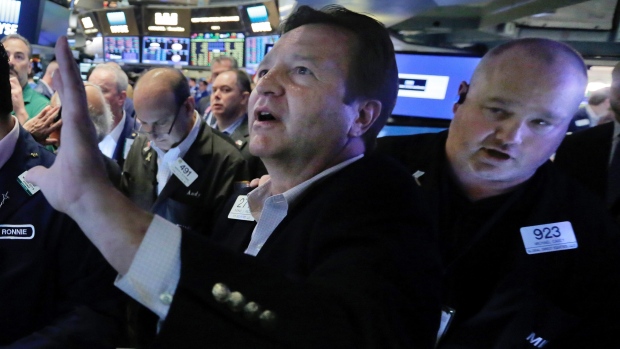Mar 13, 2018
U.S. stocks fall as Tillerson exit, tariffs weigh; TSX gains on BoC caution
Reuters

Wall Street's major indexes fell on Tuesday as the dismissal of U.S. Secretary of State Rex Tillerson and the possibility of additional U.S. import tariffs against China dragged down stocks across sectors.
President Donald Trump fired Tillerson after a series of public rifts over issues including North Korea and Russia. Trump has appointed CIA Director Mike Pompeo, seen as loyal to the president, to replace Tillerson. To lead the CIA, the president has tapped Gina Haspel, the agency's deputy director.
"Any time there's change, investors get nervous," said John Carey, portfolio manager at Amundi Pioneer Asset Management in Boston. "They have to go back to the drawing board to figure out what the implications might be."
Still, Carey said, at least the nominees to lead the State Department and the CIA are familiar names.
"I don't think either change will be troubling to the market as people reflect on the qualifications of the people stepping into the roles," he said.
U.S. stocks added to losses after Politico reported that a package of tariffs targeting US$30 billion a year in Chinese imports could be rolled out as soon as next week.
"This may be upsetting the apple cart," said Bryan Novak, senior managing director at Astor Investment Management in Chicago. "When you look at tariffs, you don't just look in a vacuum. You look at what follows on top of (them). It's worth watching a bit more, to see the follow-through on our side and their side, but there could be some anxiety around it."
The markets had opened higher after data showed U.S. consumer price growth slowed in February, an indication that an anticipated pickup in inflation probably will be only gradual.
The Dow Jones Industrial Average fell 171.58 points, or 0.68 per cent, to 25,007.03, the S&P 500 lost 17.71 points, or 0.64 per cent, to 2,765.31 and the Nasdaq Composite dropped 77.31 points, or 1.02 per cent, to 7,511.01.
Tech and financial stocks were the biggest laggards among the S&P 500's 11 major sectors.
Shares of Microsoft Corp, Facebook Inc and Alphabet Inc fell between 1.5 per cent and 2.4 per cent.
"Technology rallied hard yesterday and last week, and there is profit-taking, but it's just a short-term pressure," said Ken Polcari, director of the NYSE floor division at O'Neil Securities in New York.
Financial stocks were weighed as U.S. Treasury yields fell in response to the CPI data and Tillerson's exit.
Among individual stocks, General Electric Co fell 4.4 per cent after J.P. Morgan cut its price target on the stock to US$11 from US$14, saying the industrial conglomerate was not a "safety stock" in a volatile market.
Declining issues outnumbered advancing ones on the NYSE by a 1.27-to-1 ratio; on Nasdaq, a 1.55-to-1 ratio favored decliners.
The S&P 500 posted 43 new 52-week highs and no new lows; the Nasdaq Composite recorded 180 new highs and 24 new lows.
Volume on U.S. exchanges was 6.89 billion shares, compared to the 7.13 billion average for the full session over the last 20 trading days.
CANADIAN MARKETS
Canada's main stock index ended higher on Tuesday as gold and energy companies advanced and as comments from Bank of Canada Governor Stephen Poloz indicated the central bank will remain cautious in its policy decisions.
The Toronto Stock Exchange's S&P/TSX composite index rose 42.35 points, or 0.27 per cent, to 15,647.14. The head of the Bank of Canada said there remains a degree of untapped potential in the Canadian economy, particularly in the labor market, that means the country may be able to generate more growth without higher inflation.
The gold subsector rose 1.2 per cent as gold prices climbed following the ouster of U.S. Secretary of State Rex Tillerson by President Donald Trump. Spot gold was up 0.3 per cent at US$1,326.49 an ounce. Materials and energy shares were among the biggest positive influences on the Toronto market. The materials index was up 1.1 per cent, while the energy sector gained 0.5 per cent
U.S. crude prices settled down 68 cents, at US$61.36 a barrel, on expectations that U.S. output will rise this year. Healthcare shares were up 0.1 per cent, with Valeant Pharmaceuticals gaining after pricing an upsized senior note offering of US$1.5 billion.
The TSX posted six new 52-week highs and one new low. Across all Canadian issues there were 76 new 52-week highs and 24 new lows.The largest percentage gainer on the TSX was Torex Gold Resources, which rose 8.6 per cent, while the largest decliner was Pason Systems, down 3.1 per cent.
Among the most active Canadian stocks by volume were Bombardier B, up 1.1 per cent to $3.75; Neovasc Inc , down 15.6 per cent to 19 cents, and Aurora Cannabis , down 2.2 per cent to $11.40.








